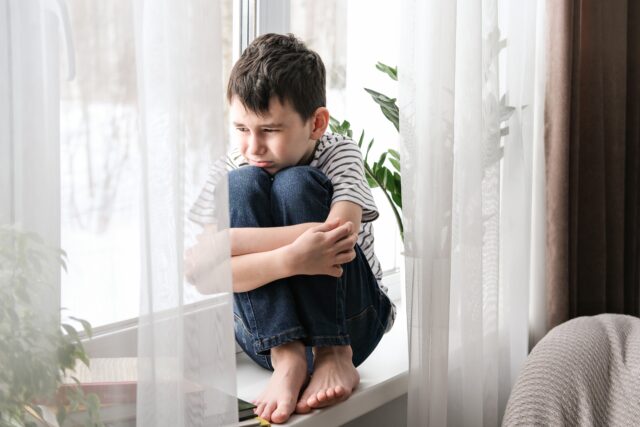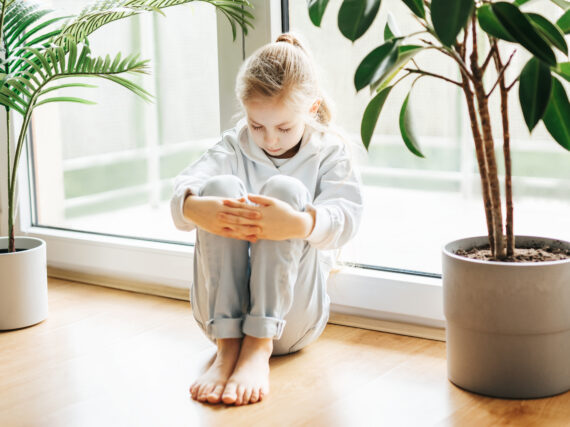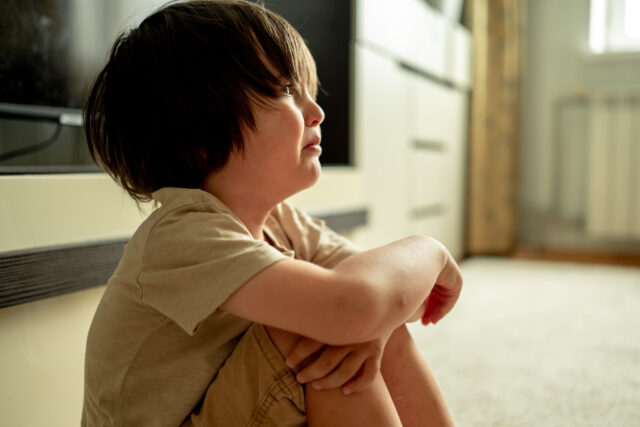Kids crave physical touch, little hugs, words of affirmation — it’s how they learn they’re loved and safe. When kids don’t get those things consistently, it can create deep-rooted insecurities. Without placing blame, it’s important to understand why you might struggle with certain things as an adult. If some of these resonate with you, it might be a sign that your emotional needs weren’t fully met as a kid.
1. You have trouble accepting compliments.

When someone says something nice about you, do you squirm? Deflect the compliment with a joke, or downplay it, like, “Oh, this old thing?” Deep down, you don’t feel worthy of praise because your sense of self-worth didn’t have a chance to fully develop, Psychology Today explains. It’s time to start challenging the negative voice in your head and truly internalize the good things people say about you.
2. You’re always trying to “earn” love.

Maybe you feel like you constantly have to prove yourself to your partner, boss, or friends. You might be a people-pleaser who sacrifices your own needs to gain approval. This stems from a subconscious belief that love is conditional, that you have to perform a certain way to be worthy of it.
3. Physical touch makes you uncomfortable.

Hugs, casual back rubs, or even just holding hands might feel awkward. If you weren’t used to physical affection as a child, it can feel invasive or unnatural even as an adult. It takes time and practice, but gently exploring healthy touch with those you trust can help rewire your response.
4. Trusting people is a real struggle.

If a child’s basic needs for love and safety aren’t consistently met, they learn the world isn’t reliable. This can make you hesitant to let people get close, even if they seem genuinely good. Building trust takes time, but remind yourself that not everyone will let you down like you might have experienced in the past.
5. Your inner critic is extremely loud.

Feeling unloved as a child can make you your own worst enemy. That negative voice in your head constantly nitpicks, makes you doubt yourself, and reminds you that you’re not good enough. Learning to counter those harsh thoughts with self-compassion is essential for healing.
6. External validation is a must.

When you don’t have a strong sense of self-worth, you look outside yourself to feel okay. You might get hooked on social media likes, fish for compliments, or tie your entire mood to how your partner, boss, or a friend treats you. Remember, true validation needs to come from within.
7. You just can’t set boundaries for the life of you.

Fear of abandonment can make you say “yes” when you want to say “no”. If your love was conditional as a child, you might’ve learned that voicing your needs would upset people and make them withdraw. Learning that you can have healthy boundaries and be loved is a must, even if it feels uncomfortable at first.
8. You’re either clingy or avoidant in relationships.

Lack of affection often leads to either feeling desperate for closeness out of fear it’ll be taken away, or pushing people away as a pre-emptive defence mechanism, Verywell Mind explains. Both are unhealthy, but understandable. It’s possible to find a balance between secure attachment and healthy independence in relationships.
9. You feel like an outsider, even in groups.

Deep down, there’s this sense that you don’t truly belong anywhere. If you didn’t experience secure attachment as a kid, you may feel like an observer rather than a true participant, even with your friends or family. This sense of isolation can be painful, but working through it in therapy or building a solid support system can help.
10. Expressing your feelings is a serious struggle.

Maybe you bottle things up and avoid talking about your feelings. Or, you have big emotional outbursts that seem out of proportion to the situation. Having your emotional needs neglected as a child means you don’t have good modelling for healthy emotional expression. It’s a skill you can learn, even as an adult!
11. You’re drawn to emotionally unavailable people.

Sadly, we tend to subconsciously recreate patterns from our past. If you didn’t get the love and attention you needed as a kid, you might repeat that pattern with partners who withhold affection. It’s a painful cycle, but recognizing it is the first step toward breaking it and choosing healthier partners.
12. You idealize past relationships.

Do you look back at an ex and remember them more positively than they probably deserve? This is common for people who crave the affection they lacked. You might gloss over the bad times and focus on those few moments when things felt good as a way to fill that void.
13. You have trouble saying “no” (even when you want to).

If a child grows up feeling their needs don’t matter, they become adults who are terrified of asserting themselves. You might avoid even the smallest confrontations or let people take advantage of you because deep down, you fear rejection if you speak up for yourself.
14. You’re terrified of being abandoned.

This deep-seated fear can drive a lot of behaviour. You might become overly clingy in relationships, tolerate mistreatment, or sabotage things preemptively out of a belief they’ll leave you eventually anyway. Healing this fear is possible and will free you from so much relationship anxiety.
15. You’re a perfectionist who’s never good enough.

Perhaps you set impossibly high standards, hoping if you’re just perfect THEN you’ll finally be loved. Unfortunately, it’s a trap because no matter how much you achieve, that insecure child inside always feels lacking. Self-compassion is key to breaking free.
16. You struggle with intimacy (emotional and/or physical).

True intimacy requires vulnerability. If you grew up feeling unsafe and unloved, letting someone see your true self can feel terrifying! You might crave closeness, yet sabotage it when things get real. This can affect romantic relationships and close friendships alike.
17. You feel chronically lonely, even when surrounded by people.

If you couldn’t form secure bonds early in life, you may carry that void inside. It’s less about how many people are in your life, and more about never feeling truly connected and understood at a deeper level. This takes time to heal, but it’s absolutely possible!




